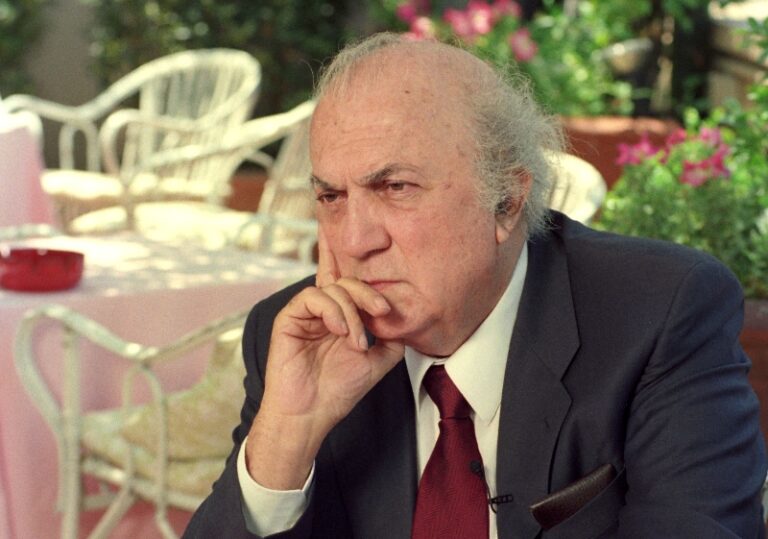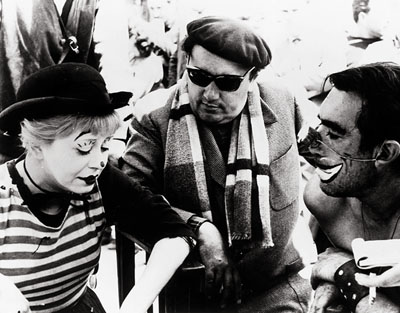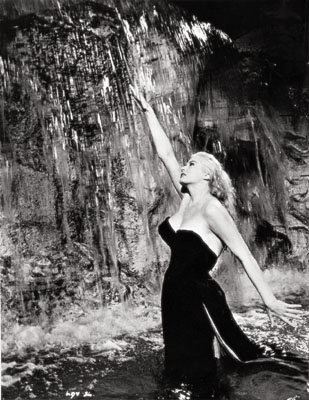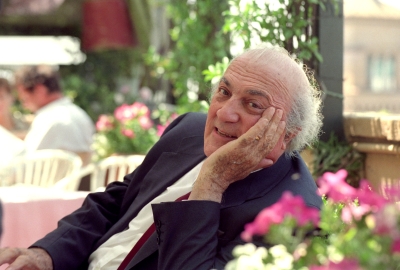The 2nd
LaureateTheatre/ Film
Federico Fellini

Federico Fellini was born in the resort of Rimini on Italy’s Adriatic coast,and grew up fascinated by the circuses,fairgrounds and music-halls which played there. He took this fascination into his filmmaking: his work is never less than spectacular. La Strada,1954,was the film that established him,but it was La Dolce Vita,1960 and 81/2,1963,which fully expressed Fellini’s mature technique,dispensing with narrative coherence to a greater or lesser degree and instead allowing fact and fantasy to spin together indiscriminately through a blender of sumptuous black-and-white imagery. The darkness of Fellini’s cinematic imagination,combined with the extraordinary fertility of his imagery,left Fellini in the company of very few others at the summit of Italian filmmaking.
Biography
In 1971 the veteran American director Frank Capra published his autobiography,The Name Above the Title. Although that may appear an unbecomingly immodest claim,it was in fact historically justified,a reflection of the fact that,in the early thirties,Capra was one of the very few Hollywood filmmakers whose name was familiar to both critics and public alike. How times have changed! These days every director of note will ensure,contractually if need be,that his name is emblazoned above the title,and it is some measure of the exceptional prestige long enjoyed by Fellini that his name most often was the title. Fellini Satyricon,Fellini Roma,Fellini’s Casanova – never in the history of the medium has a series of films been so intimately,exclusively,identified with the man who directed them.
Fellini was the prime example of an artist capable of transforming himself into a work of art,capable,by some mysterious alchemical process,of turning himself into a film. So much so that,for any spectator unwilling to embark on his gaudy treadmill of circuses and comic strips,of cardinals and carnivals,of Barnum and ballet,there was not a single un-Fellinian element in the films to which he or she could respond.
Unusually,too,when several of his films went out on international release,their titles were left in the original language,almost as though there were a serious risk of their sounding not just less Italian but less indelibly ‘Fellinian’ in translation. Thus I Vitelloni,1953,has never been known as ‘The Loafers’ nor La Strada (the film that established him),1954,as ‘The Road’ nor Il Bidone,1955,as ‘The Swindle’ nor La Dolce Vita as ‘The Sweet Life’ nor Amarcord,1973,as ‘I Remember’. (That last title was half-invented and half-derived from ‘amarcor’,a word in Romagnola patois: it is probable,however,that its primary appeal to the director lay less in its sense than in its sound,which he liked to compare to that of Kurosawa’s Rashomon.)
Fellini’s films may be said to distil the very essence of cinematic spectacle,and it has become impossible to refer to them without equally referring to their ultimate source of inspiration,the circus. The circus,however,not merely as a spectacle but as one of the last truly communal entertainments. A part of what makes his work so pleasurable is our vivid impression of what it must have been like to be involved in its creation. It is not too fanciful to suggest that we actually feel transported to the vast,draught-haunted sound stages of Cinecittà,with all their actors,extras,freaks,sycophants and hangers-on,the by now familiar fauna and flora of Felliniana,enjoying the noisy,fractious,exuberant shoot as much as we enjoy the film that it engenders.
Federico Fellini was born in Rimini,on Italy’s northern Adriatic coast,in 1920,into a middle-class family,and from his infancy he was fascinated by the circuses,fairgrounds and music-halls which played such a prominent part in the seasonal routine of that resort city. Although much of Fellini’s early life is inextricable from the fantasies that he ceaselessly embroidered around it,it does seem likely that as a child he ran away from boarding school to join a travelling circus. Just as,in his late adolescence,he would run away again to,as it were,join the cinema.
The defining schism of his career came with La Dolce Vita,1960,a lengthy and ambitious satire of contemporary Roman high society anathematized both by the Vatican and the Italian government,but also a phenomenon such as the medium has seldom known. And the film which succeeded it,8 1/2,‘the story of a director who is trying to pull together the pieces of his life and make sense of them’,in Fellini’s own words,was the first to dispense with narrative coherence altogether,choosing instead to let fact and fantasy spin indiscriminately through a blender of black-and-white imagery as mouth-watering as a box of liquorice allsorts. It was a style to which he would remain thereafter faithful – in the eerily erotic Satyricon,a work closer to the tradition of science-fiction than to that of conventional historical reconstruction; in the gross,almost medieval eighteenth-century which was evoked in Casanova; and in the homage to that communal masturbatorium that the cinema used to be in City of Women – three films in which Fellini’s normally warm Mediterranean lyricism was chilled by a shiver from the void.
These late works have always divided critics. Fellini’s own feeling,however,was that to limit one’s admiration to his early and more modest films was an example of ‘arrested development’,and history will surely prove him right. For only a pinchpenny soul would denigrate the generosity,even on occasion the profligacy,of the powers of invention which,again and again,they displayed.
Gilbert Adair
Chronology
The Nights of Cabiria,Fellini's second Oscar
Publication of autobiography,Fellini on Fellini
Awarded the Praemium Imperiale Prize for Theatre/Film,the Japan Art Association,Tokyo
-

La Strada, 1954
-

La Dolce Vita, 1960
-

In Roma

